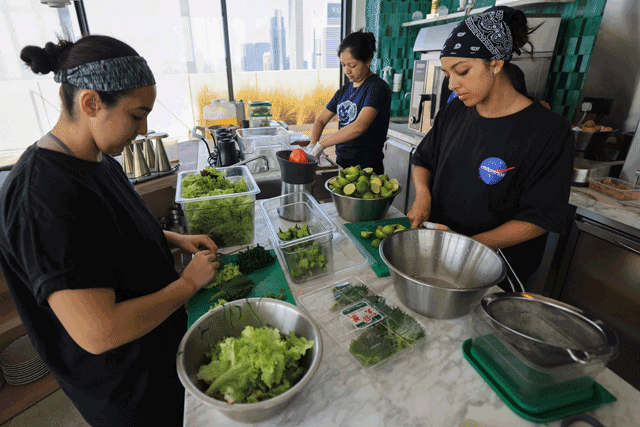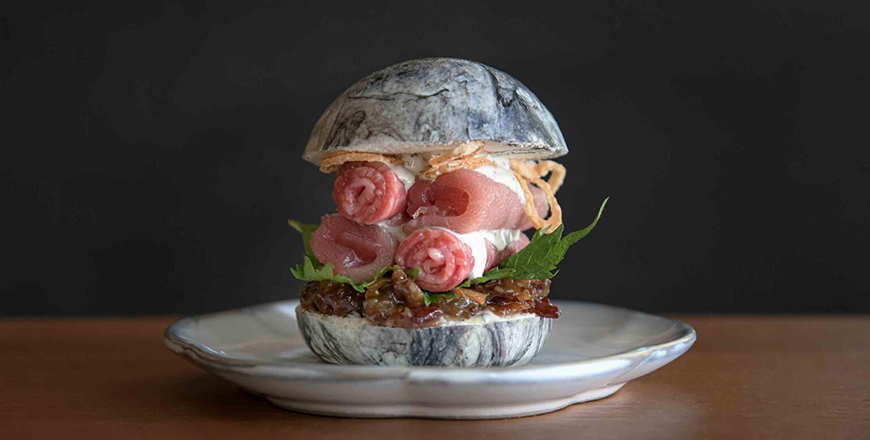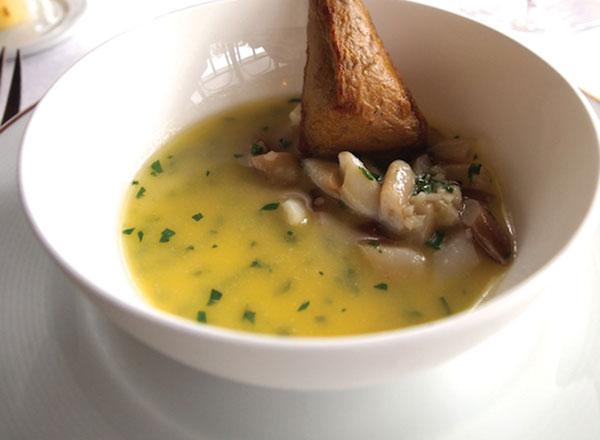You are here
Glitzy Dubai hungry for culinary fame
By AFP - Jul 26,2023 - Last updated at Jul 26,2023

Chefs prepare dish ingredients at Moonrise Middle Eastern-Japanese fusion restaurant in Dubai on July 3 (AFP photo)
DUBAI — French chef Renaud Dutel never thought his career would take him to the United Arab Emirates’ glam hub of Dubai, but has found there a culinary capital in the making.
Five years since he was offered a spot at a fancy restaurant in the Gulf financial and tourism hub — better known for its skyscrapers than its food scene — Dutel is delighted to have “taken the risk”.
“I believe Dubai is at the beginning,” he told AFP as lobster cuts were sizzling on a skillet beside him at STAY, a Michelin-starred restaurant specialised in French cuisine on the city’s signature Palm Jumeirah man-made island.
“But [Dubai] is on the way to becoming one of the best destinations in the world to come to dine.”
Boasting about 13,000 restaurants and cafes, some of the city’s eateries are already making global waves.
Last year, 11 Dubai restaurants were awarded the Middle East’s first Michelin stars, with more joining the prestigious club this year.
Some like STAY by Yannick Alleno clinched two stars, but none made it to three — Michelin’s highest honour.
“Dubai’s gastronomy scene has transformed the city into one of the most diverse and dynamic food hubs in the world,” said Issam Kazim of the local government’s tourism and economy department.
‘100 per cent Dubai’
The UAE, a five-decade federation of seven emirates along the eastern coast of the Arabian Peninsula, lacks the rich culinary heritage of other Arab states.
The meat-heavy Emirati cuisine is strongly influenced by historic trade ties with present-day Iran and India.
But it did not see the “gastronomisation” that culinary traditions in much of the West did, according to Loic Bienassis of the European Institute for the History and Culture of Food.
Still, it “can be done”, he told AFP. “And political will can play a role.”
Instead, with expats largely outnumbering the local Emirati population, the city’s rich cultural mix has yielded a unique culinary identity.
Moonrise, a rooftop restaurant which offers a Middle Eastern-Japanese fusion and only seats 12 people at a time, is a prime example.
Solemann Haddad, Moonrise’s head chef and co-owner, described the food as one-third European, one-third Japanese and one-third Arabic, “but it’s 100 percent Dubai”.
Haddad, born in the city to French and Syrian parents, won a coveted Michelin star last year at the ripe age of 27.
His dishes reflect the cosmopolitan spirit of Dubai, he told AFP, combining elements such as date syrup with a chutney of saffron and pineapple.
Having established itself as a business and luxury hot spot, Dubai is now also attracting some of the world’s leading culinary names including Alleno and fellow Frenchman Pierre Gagnaire.
Desert-sourced
Britain’s Gordon Ramsay, Japan’s Nobu Matsuhisa and Italy’s Massimo Bottura have also joined the roster of celebrity chefs with a presence in the city.
But beyond importing top talent, Dubai is also fostering local stars, said Habib Al Mulla, an Emirati lawyer and culinary blogger who has reviewed more than 700 establishments worldwide.
“A new, young generation of homegrown chefs are coming up,” he told AFP.
“Many of them are winning... worldwide recognition.”
Dubai’s rising culinary stars include not only chefs but also restauranteurs such as Omar Shihab, born and raised in the UAE to a Jordanian family.
The restaurant he founded, BOCA, was awarded the Michelin Green Star for sustainability this year.
Shihab sources a bulk of his produce from the UAE — a feat in a country that imports more than 80 per cent of its food needs.
“Let’s face it, we live in the desert,” he told AFP.
“But through our sourcing policy, we prioritise local ingredients.”
Some 30-40 per cent of fruit and vegetables served at BOCA come from hydroponic Emirati farms, and up to 80 per cent of the fish sourced from the UAE or nearby shores, said Shihab.
“We do not have any local or regional suppliers” for meat and chicken, he said.
“But we make sure that the farms we rely on, we know their names, we know a little bit about their practises, no matter where they are in the world.”
Related Articles
AMMAN — MENA’s 50 Best Restaurants was recently unveiled, and Dubai restaurants once again dominated the list.
At 69 retirement is out of the question for celebrated French chef Joel Robuchon. Far from slowing down, the most starred chef in the world has just opened a new restaurant with the objective of winning yet another three Michelin stars to add to his tally of 28.
Two French restaurants tasted the ultimate accolade in top-level gastronomy on Monday, winning three coveted Michelin stars in the guide’s 2015 edition.

















